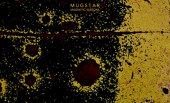You get the sense that if this, Melody Prochet’s debut album, had come out a couple of years ago when everyone was blissfully basking in Beach House’s ‘Teen Dream’ album, it’d currently be being talked up as an album of the year. However, the softer sounds of dreampop, chillwave, lushcore, bubblebuzz, snoregasm or whatever we were calling it aren’t as prevalent now. That may mean this album doesn’t get the audience it probably deserves, or it may mean it escapes terminal association with a dying genre – time will tell. Taking it out of context completely makes it easier to judge. It’s a nice album. And I mean that in the nicest possible way. Honestly I do.
In terms of audience, the fact that Tame Impala’s Kevin Parker produced the album and played much of it means that it has still garnered a fair amount of attention. It certainly bears his easy-burning brand of sunny psychedelia – the textures conjured from his Perth studio are so warm you can almost feel them. However, it’s a less sunny band that the album more often recalls: Broadcast. Prochet picks out very similar melodic lines to the ones that the late Trish Keenan used to spin, making it tempting to simply paint Prochet as a gallic incarnation of the much-mourned singer. However, the main difference concerns tone – whereas Keenan’s vocals were always cast with an icy clarity, Prochet is brighter and breathier. Slightly less distinctive, admittedly, but it works well with the music.
And some of the music is superb. The album begins with the beautiful, slightly melancholic arpeggios of “I Follow You”, with the dreamy atmosphere only disturbed by a satisfyingly unexpected guttural guitar solo at the end. “Crystallized” then employs a well-judged, flanged guitar line to enhance the ambience, drifting past a condensed electronic beat like a mushroom-shaped cloud (of the psylocibin rather than atomic variety). Meanwhile, “Some Time Alone, Alone” could almost be a Tame Impala number, what with it being immaculately put together and centered on the need for solitude.
The quirky “Quand Vas Tu Rentrer?” stands out by being in 5/4 time and one of the only songs sung in French, but the quality does drop a little afterwards, with the seaside synths of “Mount Hopeless” coming across a bit Groove Armada-y. Meanwhile, the experimental instrumental “Is That What You Said” caused two women in the room I was playing it in to exclaim “that’s horrible”, adding a mischievous squirt of citrus to the almost relentlessly honeyed tones.
Things recover grandly for the closing song, “Be Nice To Your Kids”, which features samples of a child happily babbling over some charming descending scales. It’s a lovely way to wrap up a lovely album. In fact, the only problem with it is that words with bland, beige associations like lovely and nice are actually the most fitting ones to describe it. Is that a bad thing? Sometimes. But not here.






Follow us
Follow us on Facebook Follow us on Twitter Follow us on Google+ Subscribe our newsletter Add us to your feeds